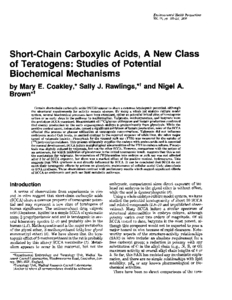Coakley, ME; Rawlings, SJ; Brown, NA
(1986)
SHORT-CHAIN CARBOXYLIC-ACIDS, A NEW CLASS OF TERATOGENS - STUDIES OF POTENTIAL BIOCHEMICAL-MECHANISMS.
ENVIRONMENTAL HEALTH PERSPECTIVES, 70.
105 - 111.
ISSN 0091-6765
SGUL Authors: Brown, Nigel Andrew
![[img]](https://openaccess.sgul.ac.uk/107195/1.hassmallThumbnailVersion/envhper00441-0100.pdf)  Preview |
|
["document_typename_application/pdf; charset=binary" not defined]
Published Version
Available under License St George's repository terms & conditions.
Download (1MB)
| Preview
|
Abstract
Certain short-chain carboxylic acids (SCCA) appear to share a common teratogenic potential, although the structural requirements for activity remain obscure. By using a whole rat embryo culture model system, several biochemical processes have been examined, either as potential initial sites of teratogenic action or as early steps in the pathway to malformation. Valproate, methoxyacetate, and butyrate were the prototype SCCA examined. Measurement of [14C]glucose utilization and lactate production confirmed that energy production by the early organogenesis embryo is predominantly from glycolysis. While the positive control agent, iodoacetate, caused a significant inhibition of lactate production, none of the SCCA affected this process or glucose utilization at teratogenic concentrations. Valproate did not influence embryonic acetyl CoA levels, in marked contrast to the reported response of adult liver, the other major target of valproate toxicity. Pinocytosis by the visceral yolk sac (VYS) was measured by the uptake of [125I]polyvinylpyrrolidone. This process ultimately supplies the embryo with amino-acids and is essential for normal development. SCCA induce morphological abnormalities of the VYS in embryo culture. Pinocytosis was slightly reduced by valporate, but not the other SCCA. However, comparison with the action of an antiserum, for which inhibition of pinocytosis is the initial teratogenic insult, suggests that this is not the mechanism for valproate. Incorporation of [3H]thymidine into embryo or yolk sac was not affected after 3 hr of SCCA exposure, but there was a marked effect of the positive control, hydroxyurea. This suggests that DNA synthesis is not directly influenced by SCCA.(ABSTRACT TRUNCATED AT 250 WORDS)
| Item Type: |
Article
|
| Additional Information: |
Reproduced with permission from Environmental Health Perspectives, 1986 Dec; 70:105–111. |
| Keywords: |
Acetyl Coenzyme A, Animals, Carboxylic Acids, DNA Replication, Embryo, Mammalian, Glycolysis, Organ Culture Techniques, Pinocytosis, Rats, Structure-Activity Relationship, Teratogens, Science & Technology, Life Sciences & Biomedicine, Environmental Sciences, Public, Environmental & Occupational Health, Toxicology, Environmental Sciences & Ecology, ENVIRONMENTAL SCIENCES, PUBLIC, ENVIRONMENTAL & OCCUPATIONAL HEALTH, SCI, Toxicology, 11 Medical And Health Sciences, 05 Environmental Sciences |
| SGUL Research Institute / Research Centre: |
Academic Structure > Institute of Medical, Biomedical and Allied Health Education (IMBE) |
| Journal or Publication Title: |
ENVIRONMENTAL HEALTH PERSPECTIVES |
| ISSN: |
0091-6765 |
| Related URLs: |
|
| Web of Science ID: |
WOS:A1986G349000011 |
| Dates: |
| Date |
Event |
| 1986-12-01 |
Published |
|
| URI: |
https://openaccess.sgul.ac.uk/id/eprint/107195 |
Statistics
Item downloaded times since 12 Feb 2015.
Actions (login required)
 |
Edit Item |


